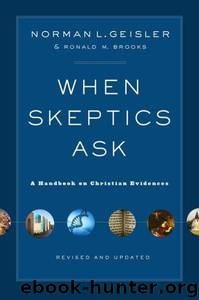When Skeptics Ask: A Handbook on Christian Evidences by Norman L. Geisler & Ronald M. Brooks

Author:Norman L. Geisler & Ronald M. Brooks [Geisler, Norman L. & Brooks, Ronald M.]
Language: eng
Format: epub
Tags: Religion, Philosophy, Reference, Christian
ISBN: 9780801014987
Publisher: Baker Books
Published: 1990-02-01T00:00:00+00:00
The chief secretary to Emperor Hadrian ( A.D. 117–138) likewise says, “After the great fire at Rome … less punishments were also inflicted on the Christians, a sect professing a new and mischievous religious belief.” 19 He also notes that Claudius expelled the Jews from Rome in A.D. 49 because of rioting “at the instigation of 18 Tacitus, 15:44.
19 Suetonius, Nero, 16.
Chrestus.” 20 This explains why Aquila and Priscilla, whom Paul met in Corinth ( Acts 18:2 ), had to leave their home in Italy.
Josephus
This was a Jewish historian working for the Romans in the first century. In a disputed passage, he gives a description of Jesus.
At this time there was a wise man who was called Jesus. And his conduct was good and
[he] was known to be virtuous. And many people from among the Jews and other nations became his disciples. Pilate condemned him to be crucified and to the. And those who had become his disciples did not abandon his discipleship. They reported that he had appeared to them three days after his crucifixion and that he was alive; accordingly, he was perhaps the messiah concerning whom the prophets have recounted wonders. 21
This should not be taken to indicate that Josephus believed this, but the fact that neither he nor any other contemporary of the apostles make any attempt to refute the Resurrection is significant. If the tomb was still scaled or the body had been found, it seems that they would have mentioned it. Instead they present it is as the belief of Christians without comment.
The Talmud
The rabbinical commentary on the Torah makes an interesting note about Jesus: On the eve of Passover Yeshua was hanged. For forty days before the execution took place, a herald went forth and cried, “he is going forth to be stoned because he has practiced sorcery and enticed Israel to apostasy. Anyone who can say anything in his favour, let him come forward and plead on his behalf.” But since nothing was brought forward in his favour he was hanged on the eve of the Passover. 22
Support from Heretics
The Gnostic gospels may not be a good source of information about Jesus’ life or theology, but they do contribute something to our understanding of history. They show that there was a certain core of information about Jesus’ life and death that was so widely accepted, that they could not alter it—they had to build on top of it. These books, written mostly by men pretending to be biblical apostles, are the legendary developments and myths that arose from the historical facts of Christianity’s origin.
Their agreement in the essentials that (1) Jesus was God in human form, (2) that He was persecuted and crucified, (3) that He was believed to have risen from the dead, 20 ——, Claudius, 25.
21 Josephus, Antiquities, 18:3 from the Arabic text as it appeared in “New Evidence on the Life of Jesus,” The New York Times, February 12, 1972, pp. 1, 24.
22 The Babylonian Talmud, Sanhedrin, 43a.
and (4)
Download
This site does not store any files on its server. We only index and link to content provided by other sites. Please contact the content providers to delete copyright contents if any and email us, we'll remove relevant links or contents immediately.
The Secret Power of Speaking God's Word by Joyce Meyer(3180)
Signature in the Cell: DNA and the Evidence for Intelligent Design by Stephen C. Meyer(3130)
Real Sex by Lauren F. Winner(3014)
The Holy Spirit by Billy Graham(2944)
The Gnostic Gospels by Pagels Elaine(2527)
Jesus by Paul Johnson(2352)
Devil, The by Almond Philip C(2324)
23:27 by H. L. Roberts(2248)
The Nativity by Geza Vermes(2226)
Chosen by God by R. C. Sproul(2161)
All Things New by John Eldredge(2159)
Angels of God: The Bible, the Church and the Heavenly Hosts by Mike Aquilina(1957)
The Return of the Gods by Erich von Daniken(1943)
Angels by Billy Graham(1922)
Knowing God by J.I. Packer(1854)
Jesus of Nazareth by Joseph Ratzinger(1811)
The Gnostic Gospel of St. Thomas by Tau Malachi(1793)
Evidence of the Afterlife by Jeffrey Long(1786)
How To Be Born Again by Billy Graham(1777)
